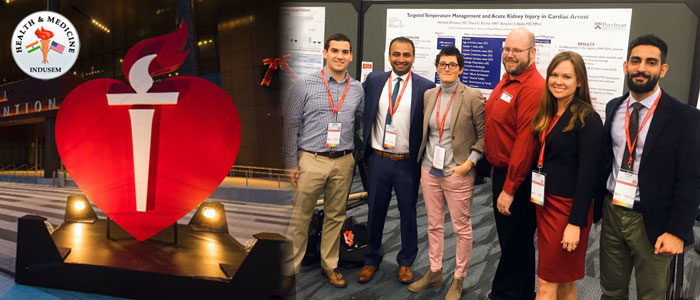Abhishek Bhardwaj from the University of Pennsylvania, Philadelphia, USA was recognized for his cardiac arrest research at the American Heart Association conference at Anaheim, California, USA. Dr. Bhardwaj received the prestigious ‘Young Investigator Award’ for his work on identifying the incidence of Acute Kidney Injury (AKI) after Cardiac Arrest (CA) in the adult population and the effect of Targeted Temperature Management (TTM) on AKI post-CA.
In his role as a critical care physician and a resuscitation fellow at Penn, Dr. Bhardwaj identified AKI as a common complication after cardiac arrest. Under the supervision of his mentor Dr. Benjamin Abella, who is a leader and an expert in the field of resuscitation science (Professor of EM, Director of Center for Resuscitation Science (CRS) and Vice Chair of EM Research at the University of Pennsylvania), Dr. Bhardwaj found that ~ 25 % of the patients suffered from AKI after cardiac arrest. Further, Targeted Temperature Management (previously called hypothermia) did not have deleterious or protective effect on AKI after CA. Based on his study, Dr. Bhardwaj concluded that although the incidence of AKI is high in post-CA population, the use of Targeted Temperature Management has no adverse effect on the renal function outcomes in this patient population. He believes that the use of TTM should continue post CA and further research is warranted to identify the impact of TTM on AKI and Chronic Kidney Disease. Dr. Bhardwaj and his mentor Dr. Abella are planning to continue to study the effects of cardiac arrest on end organ damage and finding ways to minimize the same.
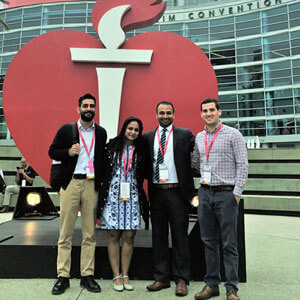
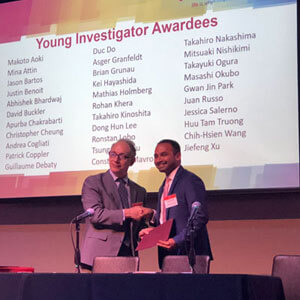
Dr. Bhardwaj also worked closely with the Director of Innovation Research at Penn – Marion Leary, MPH, MSN, RN, FAHA and presented his work on the utility of End Tidal Co2 monitoring during cardiac arrest resuscitation. He looked at how ETCo2 is affected by mechanical ventilation parameters such as the respiratory rate, tidal volume and the minute ventilation. He found that with an increase in respiratory rate, the ETCo2 decreases. His findings may have clinical implication in interpreting the ETCo2 values during cardiac arrest care. He recommends that we need to take a step back during adrenaline driven code blue management and prevent hyperventilating these patients. He reports that until we reach personalized, precise and physiologically guided CPR, End Tidal Co2 monitoring should be used as a tool during resuscitation efforts post cardiac arrest. It will guide the team leader in monitoring the quality of CPR by the team.
Apart from presenting his own research, Dr. Bhardwaj also moderated multiple sessions at the conference. He was the ‘Poster Professor’ for the Resuscitation Science Symposium poster session where physician scientists from all over the world presented their innovative strategies to improve care after traumatic hemorrhagic shock such as REBOA (Resuscitative Endovascular Balloon Occlusion of he Aorta). In another session, Dr. Bhardwaj moderated the oral abstracts session where speakers from Japan, Korea and the United States presented their work on use of vasopressors during hemorrhagic shock, the ‘dose and depth’ effect of hypoxia and hypotension on mortality after Traumatic Brain Injury and new scoring system to predict outcomes after severe trauma and the need for massive transfusion.
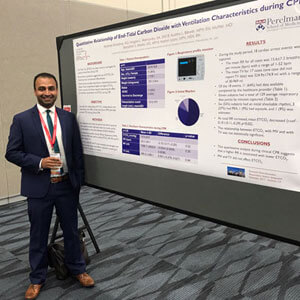
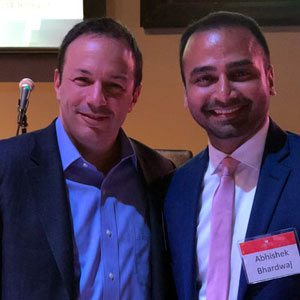
Dr. Bhardwaj found many of this year’s conference presentations to be fascinating. He is inspired by the data driven and technologically advanced pre-hospital care provided in Singapore and the Extra corporeal Life Support (ECLS) expertise of the US and Japan. He is collaborating with the resuscitation leaders from these countries to share the knowledge, experiences and expertise with the intent of improving both pre-hospital and in-hospital critical care in India. Dr. Bhardwaj believes that while we continue to strive for improvement in post cardiac arrest care, our communities need to be educated and trained in high quality CPR. There is enough evidence that high quality bystander CPR is associated with improved survival after cardiac arrest. With his life’s goal to improve critical care delivery in India, he finds the role and platform of INDUSEM extremely valuable.
Related News:
- https://www.indusem.org/resuscitation-researcher-makes-mark/
- https://www.indusem.org/indusem-leaders-star-american-heart-scientific-sessions-2016/
The American Heart Association (AHA) Scientific Sessions 2017 was organized by American Heart Association (AHA). This is an annual academic activity. The target audience was Physicians, Physician Assistants, Nurse Practitioners, Nurses, Pharmacists. This event was containing five days of the best in science and cardiovascular clinical practice covering all aspects of basic, clinical, population and transnational content. The scope and quality of the scientific exchange made Scientific Sessions the premier cardiovascular research and instructional meeting in the world. Programming was designed to improve patient care by communicating the most timely and significant advances in basic, clinical, transnational and population health research, spanning the full spectrum of cardiovascular disease from a variety of perspectives, from prevention, through diagnosis and through treatment. AHA Website www.heart.org
About INDUSEM
The INDUSEM mission is to envision and implement the future of Patient Care across the world. The partnership brings together Expert Educators, Inquisitive Innovators and Physicians supporting Safe Patient Care across India, United States and the World. INDUSEM is the Top International Partnership across the World and brings together Institutions, Individuals and Initiatives focused on improving patient care globally. Till date INDUSEM has reached over 50,000 Experts and its reach continues to grow daily. For more information, visit www.indusem.org
About UPenn
The University of Pennsylvania (commonly known as Penn or UPenn) is an Ivy League university located in Philadelphia. Incorporated as The Trustees of the University of Pennsylvania, Penn is one of 14 founding members of the Association of American Universities and one of the nine original colonial colleges. All of Penn’s schools exhibit very high research activity.[8] In fiscal year 2015, Penn’s academic research budget was $851 million, involving more than 4,300 faculty, 1,100 postdoctoral fellows and 5,500 support staff/graduate assistants.[2] 30 Nobel laureates have been affiliated with Penn. Over its history the university has also produced many distinguished alumni. These include 14 heads of state (including one U.S. president and the current president-elect); three United States Supreme Court justices plus a number of state Supreme Court justices; founders of technology companies, international law firms, and global financial institutions; and university presidents. According to a 2014 study, 25 billionaires attended the University of Pennsylvania as undergraduates, the most billionaires of any university at the undergraduate level. (Per Wikipedia) For more Info: http://www.upenn.edu/


